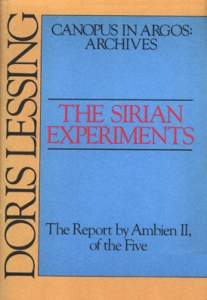The Sirian Experiments

US first edition cover (Alfred A. Knopf)
|
|
| Author | Doris Lessing |
|---|---|
| Country |
|
| Language | English |
| Series | Canopus in Argos |
| Genre | Novel (science fiction) |
| Published | 1980 Alfred A. Knopf, US, Jonathan Cape, UK |
| Media type | Print (hardcover) |
| Pages | 331 |
| ISBN | (US) 0-224-01891-4 (UK) |
| OCLC | 5941786 |
| 823/.914 | |
| LC Class | PR6023.E833 S57 1981 |
| Preceded by | The Marriages Between Zones Three, Four and Five |
| Followed by | The Making of the Representative for Planet 8 |
The Sirian Experiments is a 1980 science fiction novel by Doris Lessing. It is the third book in her five-book Canopus in Argos series and continues the story of Earth's evolution, which has been manipulated from the beginning by advanced extraterrestrial civilisations. It was first published in the United States in December 1980 by Alfred A. Knopf, and in the United Kingdom in March 1981 by Jonathan Cape. The book was shortlisted for the Booker Prize in 1981.
The Sirian Experiments relates directly to the first book in this series, Shikasta, which is the history of the planet Shikasta (an allegorical Earth) under the influence of three galactic empires, Canopus, Sirius and their mutual enemy, Puttiora. Shikasta is told from the Canopean viewpoint.The Sirian Experiments (subtitled The Report by Ambien II, of the Five) tells the story of Shikasta from the Sirian point of view and describes the activities of Sirians on the planet and the strained relations of Sirius with Canopus.
Lessing stated in an afterword in the next book in this series that The Sirian Experiments and The Making of the Representative for Planet 8 were inspired by her 50-year fascination with the ill-fated 1910–13 Antarctic expedition of Robert Falcon Scott.
Because of its focus on characterisation and social/cultural issues, and the de-emphasis of technological details, The Sirian Experiments is not strictly science fiction but soft science fiction, or "space fiction" as Lessing calls her Canopus in Argos series. Robert Alter of The New York Times suggested that this kind of writing belongs to a genre literary critic Northrop Frye called the "anatomy", which is "a combination of fantasy and morality" and that "presents us with a vision of the world in terms of a single intellectual pattern." Lessing has stated that she has used this series as a vehicle to "put questions, both to myself and to others" and to "explore ideas and sociological possibilities."
...
Wikipedia
